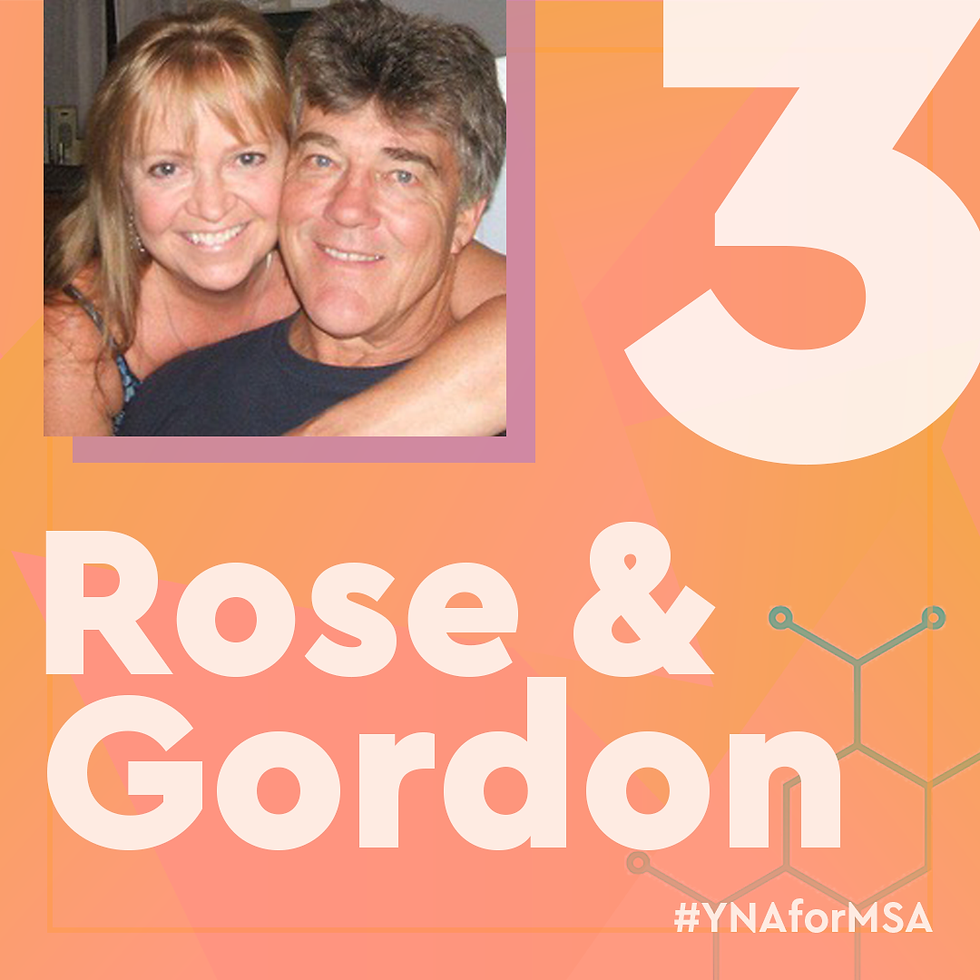Youth Neuro Australia has conducted a series of interviews with patients and carers afflicted by Multiple System Atrophy (MSA) - neurodegenerative disease that has impacted thousands in Australia. Despite this, there is a lack of awareness both within the public and the medical community. Currently, there is no charity established to support these individuals, and minimal research being conducted due to the limited funding. Through our interview series, we hope to raise awareness to help improve the life of patients and carers suffering from this brutal condition.

Gordon's Story
“At first there was the loss of balance which progressed to occasional falls, and now frequent. This was soon followed by increasingly rapid total loss of urogenital control. The back pain and muscle stiffness progressed to a rigidity that lead to the inability of walk, stand or do anything that requires muscles. Now, there is almost a total lack of speech and swallowing problems are accompanied by coughing while eating or talking. Initially many symptoms presented themselves in fairly rapid progression but currently they are in a state of steady progression, which “coasts” along for a while then takes a downslide, then “coasts” again.
The first diagnosis from the GP in December 2012 was Parkinson’s disease. But when the PD drugs were ineffective, we went to see a Specialist Neurologist in movement disorders who recognised that it was likely MSA. After clinical observation, a MIBG Heart Scan to rule out PD, and an MRI, the MSA diagnosis was confirmed in July 2013.
I was initially somewhat in denial that it was MSA as opposed to PD, perhaps wishfully thinking that it was “only PD”. My wife was very deflated when when she realised that MSA was the correct diagnosis. Now we are both resigned to this diagnosis.
Our GP had no idea about MSA, what it was or how it affected sufferers. When we moved interstate, we actually had to convince the new GP that MSA was actually a disease in itself. Several of them said that MSA was a “rubbish bin” diagnosis, meaning that they call what the patient has “MSA” when they don’t really know what it is. We got a few eye rolls when we tried to explain that it is an actual disease, and even after showing the GPs clinical articles, they were not convinced. They still refer to it as “the Parkinson’s” rather than MSA - awareness is very lacking.
I’m almost always in a wheelchair, I can’t enjoy any of the things I used to enjoy. My wife/carer tires to do things that will make life less dreary, but we can’t even have a chat anymore. I can’t drive, can’t walk, can’t talk, can’t use my camera, can barely type to send an email because it takes me hours to type a few sentences. Even reading is hard because my eyes won’t stay open.
The levodopa drugs gave very slight relief to the stiffness and slowness of movement. Physiotherapists and OTs came to our home and offered a few ideas on how to best manage symptoms with equipment. But ultimately, there is no hope of cure, no relief in sight, and only a very unpleasant end to all of this. I tried to stay positive at first, but that is gone.”
Meet Rose, Gordon's wife and full-time carer
“When I first began my role as carer, I was full of hope that I would be giving him
the best chance to fight this disease. He has not fought much at all from what I
can see. He says he is trying but it doesn’t really look that way to me, but it’s
hard to understand exactly what he is going through. I am trying to do the right
thing by him, but looking back I think perhaps I should have put him in to a care
facility. He may have been more cooperative with physios and professionals
than he has been with me. I find that I resent him for not trying harder to fight
this disease, and instead, ignoring everyone’s advice. Of course he prefers to be
home, but it’s almost like both of us have this disease, since I can’t do anything,
other than when a carer comes in, and that’s a whole different challenge
explaining everything to them. I feel guilty going anywhere because he can’t. He
wants to travel but can’t, so when I take a respite week or two and go
somewhere, I feel awful because he is stuck in a care facility. Thankfully the government funding package has helped us with equipment to make caring for him at home a possibility, but soon I think it will be more than I can manage.
A message for all the carers out there:
Breathe. Try to be patient. It’s the hardest thing I have ever done. Take time for
respite, especially as it progresses. Watching someone you love change and
lose control is horrible, so you better be strong. Reach out to support groups,
there are some in the larger centres, and if you are remote like we are, there is a
group on Facebook. It’s good to speak to people who understand.”
Find out more about YNA and MSA at our Facebook page: https://www.facebook.com/youthneuroAU/



Comments